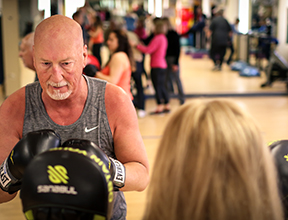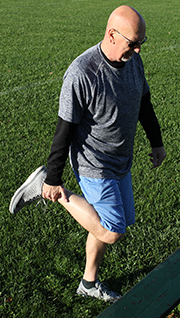Reclusive, depressed, anxious and insecure. That’s how Kent Galloway, who was diagnosed with Parkinson’s disease, four years ago, described himself just 10 short months ago. Blow by blow, Parkinson’s had slowly robbed Kent of the ability to walk, think and move like he had before the diagnosis. And, he had no reason to believe anything would change. He only expected his symptoms to progress. “When I was first diagnosed, I thought it was a death sentence,” Kent said. “I didn’t know anything about the disease other than it’s what Michael J. Fox has.”
Parkinson’s, a degenerative brain disorder, has no known cause or cure. Its symptoms include unsteady walking, tremors and difficulty with body movements. Falls are common. The condition can also cause mood disturbances, problems with thinking, and memory loss.
Detecting Early Warning Signs
Kent began noticing something wasn’t quite right about a year before he went to see a neurologist. “When I drove my car, my left hand would shake when I held the steering wheel. As time went on, the shaking got more pronounced and happened more frequently. I would put my hand in my pocket to hide it. Eventually, it got to the point where I couldn’t hide it anymore, so I went to a neurologist.”
His first neurologist, who was not affiliated with North Kansas City Hospital or Meritas Health, prescribed dopamine, a common medicine to help manage Parkinson’s symptoms. He told Kent to get his affairs in order because the disease would progress quickly. “I remember walking out of there that day thinking I didn’t have long to go.”
For a year, Parkinson’s was winning. Kent’s symptoms progressed. He lost his sense of smell, and he began having trouble keeping balance, which led to frequent falls. “I became very insecure and afraid, and I had a lot of anxiety. I removed myself from social situations. Basically, I was hiding in my house.”
As dark as those times were, Kent wasn’t quite ready to give up all hope. During a routine visit with his primary care provider, Thomas K. LaBruzzo, DO, with Meritas Health North Kansas City, he shared his diagnosis and how he was feeling. “Dr. LaBruzzo pretty much talked me off the ledge,” Kent recalled. “He said Parkinson’s wasn’t a death sentence, and he referred me to Dr. Kosa for a second opinion.”
“When I first met Kent, he was anxious and very discouraged,” said Steven C. Kosa, a neurologist with Meritas Health Neurology. “He was told his life was over, and that there wasn’t anything he could do about it. He became reclusive and depressed, and his Parkinson’s symptoms worsened. I worked on his medications, and I recommended the hospital’s Rock Steady Boxing therapy program.” Suddenly, Kent had hope in his corner.
Taking a Fighting Chance
 Why would a neurologist recommend someone with Parkinson’s take up boxing? Because it gets results. Rock Steady Boxing, the first boxing program of its kind in the U.S., is exclusively for people with Parkinson’s.
Why would a neurologist recommend someone with Parkinson’s take up boxing? Because it gets results. Rock Steady Boxing, the first boxing program of its kind in the U.S., is exclusively for people with Parkinson’s.
It was founded in Indianapolis in 2006 by Scott C. Newman. Scott, a former county prosecutor, was diagnosed with early-onset Parkinson’s at age 39. A few years after his diagnosis, he took up boxing training. The intense workouts resulted in significant improvements in Scott’s physical health, agility and daily functioning. Eventually, he opened a Rock Steady Boxing gym. The program expanded, and currently, there are more than 500 programs around the world, including the one at North Kansas City Hospital.
Rock Steady Boxing applies boxing techniques in a gentler way, meaning participants don’t get hit and they don’t spar with each other (but they do spar with the certified instructors). It’s all non-contact, and no one gets hurt.
The class is set up in stations that address many of Parkinson’s symptoms. For example, warm-up stretching helps with joint and muscle stiffness, the footwork improves balance, sparring strengthens eye-hand coordination and punching helps steady tremors. Classes consist of intense, forced, instructor-led exercise, which research has shown may help slow the progression of Parkinson’s.
Rocking Steady at NKCH

Shanna (left) and Jill helped bring Rock Steady Boxing to NKCH. They are RSB-certified and the first faces people meet when they register for class.
Dr. Kosa learned about the program from a CBS Morning News segment and contacted NKCH’s Community Health & Wellness department. Not long after, staff members Jill Sartain and Shanna Watt were on their way to Indianapolis to become certified Rock Steady Boxing instructors.
NKCH is the first hospital in the Kansas City area to offer the program, which has four different class levels. Jill and Shanna assess each new participant to determine the appropriate level.
“Anyone could qualify for Rock Steady, including people with severe symptoms,” Dr. Kosa said. “More severe patients who may require a walker or wheelchair can even participate. That’s where the Rock Steady team comes in. They perform an initial evaluation to determine eligibility and the best level of participation.”
Becoming a Contender
Fighting depression and fear, Kent gathered the courage to step outside his comfort zone and called NKCH to schedule an assessment. “I had come to the end of the line of anything I could do except take medicine and try to deal with all the cognitive and physical issues,” he said about making the move. “I thought I’d give the Rock Steady Boxing program a try because I had no other alternative.”
When Kent walked into the workout room for his first class, he wondered if he’d made a mistake in agreeing to give it a try. “There were people with various levels of the disease doing exercises that I thought were pretty basic and that didn’t make any sense to me as being helpful. I remember thinking, ‘I don’t belong here.’ But, he gave it a try. Three stations in, he had to sit down to rest. “It was harder than it looked!” he recalled.
After just one session, Kent was hooked. “I was worn out, but it made me wonder if there was something to this. Every time I went, I got a little stronger and a little more positive. I started to improve physically and cognitively.”
He’s attended Rock Steady classes for about 10 months. “I do as many classes as they will let me do. It’s an encouraging environment to be in. They motivate you to work hard. I forget I have Parkinson’s when I’m in class.”
Camaraderie is a big part of the program. “Part of the process is being there with other people who have the same thing as you,” Kent noted. “However, we don’t commiserate with each other. We know why we’re there. It’s more that when we’re done with an exercise, we look at each other and know that we’ve put in some work. Everyone has a good spirit. They are upbeat and positive and have a good sense of humor. I look forward to going to class.”
Fighting the Good Fight
 When Kent started Rock Steady, his gait was so limited that he struggled to walk 20 feet without falling. Now, he can walk a few miles most days. He took a trip to Europe last fall. For him, Rock Steady has been a life-changing experience.
When Kent started Rock Steady, his gait was so limited that he struggled to walk 20 feet without falling. Now, he can walk a few miles most days. He took a trip to Europe last fall. For him, Rock Steady has been a life-changing experience.
“I’m not the same person physically or mentally that I was 10 months ago,” he said. “I walk more, and I walk faster. My sense of smell is back, and I’m stronger. The only symptom I have now is that I still shake, but it’s intermittent. I’m able to do just about anything.”
In fact, after seeing the benefits of Rock Steady, Kent decided to join a few other classes at NKCH. “I do a yoga class twice a week that has really improved my balance, and I recently started a spin class for a little extra cardio.
While Rock Steady Boxing can be beneficial, medication is still a vital part of a treatment plan. Dr. Kosa also recommends adding a physical therapy component. “A dedicated PT program would be helpful, whether that’s through the NKCH outpatient rehabilitation department or an aquatic therapy class,” he said.
Kent has made so much progress in recent months that Dr. Kosa recently told him he could wait a year for the next follow-up appointment.
“My quality of life has improved 100%,” Kent said. “My life is good.”
Our Programs
NKCH offers two therapy programs for people with Parkinson’s.
Rock Steady Boxing
Explore RockSteadyBoxing.org. Then, call 816.691.5020 to schedule an assessment for NKCH’s program.
Lee Silverman Voice Treatment
NKCH has several LSVT Big® and LSVT Loud® certified physical, occupational and speech therapists on staff to help treat impaired voice and swallowing caused by Parkinson’s. Explore LSVTGlobal.com/Patient-Resources. Then, call 816.691.1795 to find out more about NKCH’s specific program.